西方文化入门
《西方文化史》参考书目
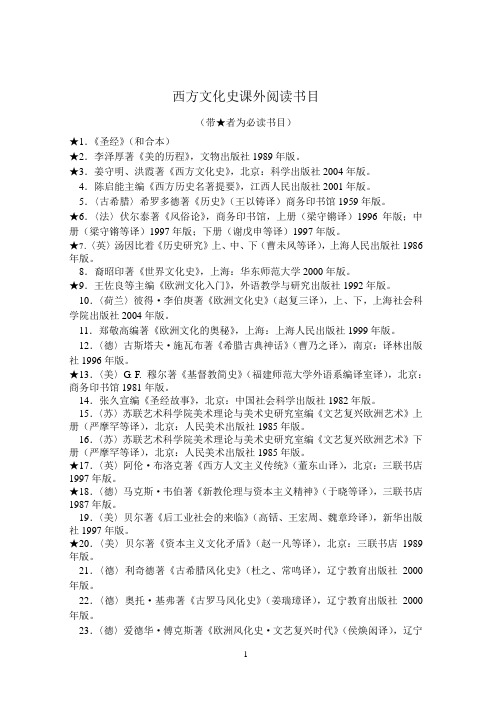
西方文化史课外阅读书目(带★者为必读书目)★1.《圣经》(和合本)★2.李泽厚著《美的历程》,文物出版社1989年版。
★3.姜守明、洪霞著《西方文化史》,北京:科学出版社2004年版。
4.陈启能主编《西方历史名著提要》,江西人民出版社2001年版。
5.〈古希腊〉希罗多德著《历史》(王以铸译)商务印书馆1959年版。
★6.〈法〉伏尔泰著《风俗论》,商务印书馆,上册(梁守锵译)1996年版;中册(梁守锵等译)1997年版;下册(谢戊申等译)1997年版。
★7.〈英〉汤因比着《历史研究》上、中、下(曹未风等译),上海人民出版社1986年版。
8.裔昭印著《世界文化史》,上海:华东师范大学2000年版。
★9.王佐良等主编《欧洲文化入门》,外语教学与研究出版社1992年版。
10.〈荷兰〉彼得·李伯庚著《欧洲文化史》(赵复三译),上、下,上海社会科学院出版社2004年版。
11.郑敬高编著《欧洲文化的奥秘》,上海:上海人民出版社1999年版。
12.〈德〉古斯塔夫·施瓦布著《希腊古典神话》(曹乃之译),南京:译林出版社1996年版。
★13.〈美〉G. F. 穆尔著《基督教简史》(福建师范大学外语系编译室译),北京:商务印书馆1981年版。
14.张久宣编《圣经故事》,北京:中国社会科学出版社1982年版。
15.〈苏〉苏联艺术科学院美术理论与美术史研究室编《文艺复兴欧洲艺术》上册(严摩罕等译),北京:人民美术出版社1985年版。
16.〈苏〉苏联艺术科学院美术理论与美术史研究室编《文艺复兴欧洲艺术》下册(严摩罕等译),北京:人民美术出版社1985年版。
★17.〈英〉阿伦·布洛克著《西方人文主义传统》(董东山译),北京:三联书店1997年版。
★18.〈德〉马克斯·韦伯著《新教伦理与资本主义精神》(于晓等译),三联书店1987年版。
19.〈美〉贝尔著《后工业社会的来临》(高铦、王宏周、魏章玲译),新华出版社1997年版。
西方文化入门复习题

西方文化入门复习题填空题1. The earliest civilization in Greece was the Cretan Civilization, also known as the Minoan Civilization.2. At the end of Mycenaean civilization, the Trojan War broke out.3. In the 6th Century B.C. the city of Sparta gained greater control of Peloponnesus by organizing an alliance of almost all the Peloponnesian states.4. The Persian wars, which were between Greek states and Persia, ended with The Battle of Marathon.5. In Greek mythology, the Olympian gods include Zeus, Hestia, Poseidon, Hades, Demeter, Hera, and other six gods.6. One of the features of Greek mythology is that gods resembled humans.7. Plato was Socrates’ student and the author of The Republic.8. The Senate was a political institution started from ancient Rome and still part of the parliaments in some western countries.9. The first Triumvirate of Rome included Caesar, Pompey, and Crassus.10. The capital city of Byzantine Empire was Constantinople.11. The exiled Jews systematically recomposed their legends and manuscripts into the book Talmud.12. The Bible of Judaism is the same as the New Testament of Christianity.13. Christianity became the sole official religion of the Roman Empire in 392 AD under the emperor Theodosius.14. Christianity has broken up into several factions, principally the Roman Catholicism, the Eastern Orthodoxy, and the Protestantism.15. After the destruction of Roman Empire in 476, Europe entered the Middle Ages, which lasted about a thousand years or so and was dominated by Germanic people whom the Romans had called savage.16. In the 7th Century, Muhammad, an Arabian merchant, founded the religion of Islam.17. The most striking feature of Renaissance was doubtless the flourishing of humanism, which was exemplified by the developments in science, religion,philosophy, literature, art, and education.18. The two leaders of religious reformation in 16th century were Martin Luther in Germany and John Calvin in France.19. Renaissance art was represented by three towering figures: da Vinci, Michelangelo, and Raphael.20. The Enlightenment, which is generally agreed to have originated in France, marked the beginning of the modern era and laid a solid foundation for the later process of the Western modernization.21. The most important book of the French philosopher Rousseau was The Social Contract which argued against the idea that monarchs were divinely empowered to legislate and theorized about the best way to establish a political community in the face of the problems of commercial society.简答题1. In what sense do you think Roman culture owed its accomplishments to the benefits obtained from Greek culture?2. How was the Jewish civilization developed after a tortuous history of split and unification?3. What are the main components of Christianity?4. Why the Byzantine Empire could stay much longer than the Western Roman Empire?5. What are the major achievements of the Renaissance?6. Briefly introduce two representative figures of the Enlightenment and their central ideas.。
西方文论教材

西方文论教材
以下是一些西方文论教材的推荐:
1. 《西方文论纲要》(An Introduction to Literature, Criticism, and Theory)- Terry Eagleton
这本书是一本经典的西方文论教材,涵盖广泛的文论理论,包括结构主义、后结构主义、女性主义、后殖民主义等等。
2. 《西方文论简史》(A Short History of Literary Criticism)- Terry Eagleton
这本书是对西方文论史发展的简明介绍,从古希腊到当代文论理论都有所涉及。
3. 《西方文学理论史》(Literary Theory: The Basics)- Hans Bertens
这本书是一本入门级的西方文论教材,解释了关键概念和主要理论流派,如结构主义、后现代主义、后殖民主义等。
4. 《西方文学理论导论》(Literary Theory: An Introduction)- Terry Eagleton
这本书是一本对西方文学理论及其应用的全面导论,涵盖了许多西方文论流派和重要的文学理论概念。
5. 《从批评到文化研究》(Beginning Theory)- Peter Barry
这本书是一本关于西方文论和文化研究的简明入门教材,涵盖了重要的文论概念和理论流派。
这些教材可以帮助读者了解并学习关于西方文论的重要理论和概念,适合那些对文学批评和文化研究感兴趣的学生和学者。
欧洲文化入门(The Age of Enlightenment)
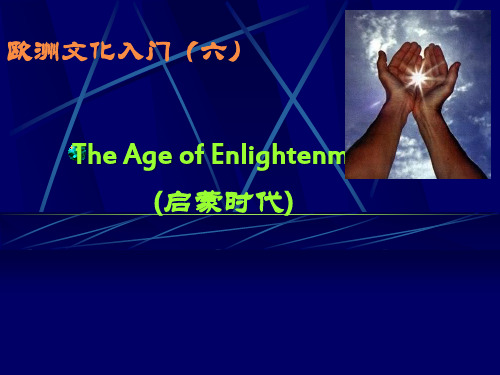
The Age of Reason 理性时代
The Enlightenment characterizes the efforts by certain European writers to use critical reason to free minds from prejudice, unexamined authority and oppresion by Church or State. Therefor it is sometimes called the Age of Reason.
Approved by the National Assembly of France, August 26, 1789
The representatives of the French people, organized as a National Assembly, believing that the ignorance, neglect, or contempt of the rights of man are the sole cause of public calamities and of the corruption of governments, have determined to set forth in a solemn declaration the natural, unalienable, and sacred rights of man, in order that this declaration, being constantly before all the members of the Social body, shall remind them continually of their rights and duties; in order that the acts of the legislative power, as well as those of the executive power, may be compared at any moment with the objects and purposes of all political institutions and may thus be more respected, and, lastly, in order that the grievances of the citizens, based hereafter upon simple and incontestable principles, shall tend to the maintenance of the constitution and redound to the happiness of all. Therefore the National Assembly recognizes and proclaims, in the presence and under the auspices of the Supreme Being, the following rights of man and of the citizen:
古代西方文化的教育和知识体系
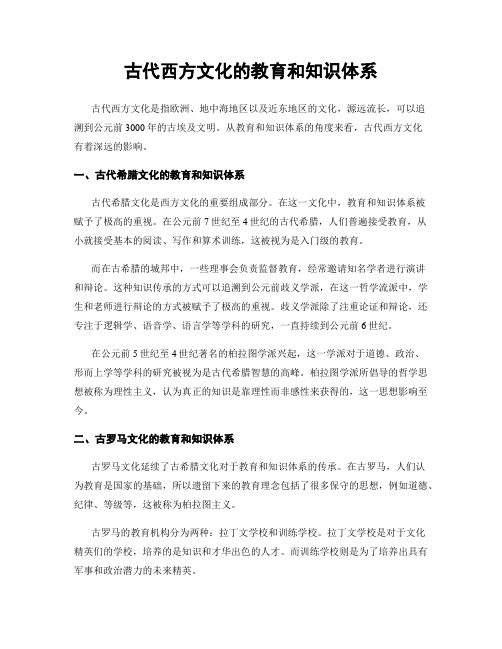
古代西方文化的教育和知识体系古代西方文化是指欧洲、地中海地区以及近东地区的文化,源远流长,可以追溯到公元前3000年的古埃及文明。
从教育和知识体系的角度来看,古代西方文化有着深远的影响。
一、古代希腊文化的教育和知识体系古代希腊文化是西方文化的重要组成部分。
在这一文化中,教育和知识体系被赋予了极高的重视。
在公元前7世纪至4世纪的古代希腊,人们普遍接受教育,从小就接受基本的阅读、写作和算术训练,这被视为是入门级的教育。
而在古希腊的城邦中,一些理事会负责监督教育,经常邀请知名学者进行演讲和辩论。
这种知识传承的方式可以追溯到公元前歧义学派,在这一哲学流派中,学生和老师进行辩论的方式被赋予了极高的重视。
歧义学派除了注重论证和辩论,还专注于逻辑学、语音学、语言学等学科的研究,一直持续到公元前6世纪。
在公元前5世纪至4世纪著名的柏拉图学派兴起,这一学派对于道德、政治、形而上学等学科的研究被视为是古代希腊智慧的高峰。
柏拉图学派所倡导的哲学思想被称为理性主义,认为真正的知识是靠理性而非感性来获得的,这一思想影响至今。
二、古罗马文化的教育和知识体系古罗马文化延续了古希腊文化对于教育和知识体系的传承。
在古罗马,人们认为教育是国家的基础,所以遗留下来的教育理念包括了很多保守的思想,例如道德、纪律、等级等,这被称为柏拉图主义。
古罗马的教育机构分为两种:拉丁文学校和训练学校。
拉丁文学校是对于文化精英们的学校,培养的是知识和才华出色的人才。
而训练学校则是为了培养出具有军事和政治潜力的未来精英。
在罗马时期,知识的传承被视为一项极为重要的事情,例如知名学者拉布莱西乌斯就在他的著作《罗马史》中大量涉及了不少希腊的哲学思想,标志着古希腊的文化得以传承下去。
三、基督教文化的教育和知识体系基督教文化是西方文化的重要组成部分,自公元1世纪初开始直到今天,它一直处于西方文化的核心位置。
在这一文化中,教育和知识体系起到了至关重要的作用。
基督教的教育和知识体系融合了许多古代文化和哲学思想,例如柏拉图主义和亚里士多德哲学。
英美概况外语类课程设计

英美概况外语类课程设计一、课程背景随着我国经济与文化的全球化,英语已逐渐成为全球通用语言,在国际交流中发挥着至关重要的作用。
为了提高学生的英语水平和文化素养,外语学院开设了英美概况外语类课程。
二、课程目标本课程旨在通过对英美文化的深入了解和学习,提高学生的英语听、说、读、写能力,培养学生的跨文化交际能力和文化理解能力。
同时,也希望通过此课程,拓宽学生的视野和世界观,加深他们对世界多样性的认识和理解。
三、课程内容1. 英美历史文化本部分的教学内容主要包括英美历史文化背景、政治制度、传统节日、文学艺术、体育娱乐、教育制度等方面的知识。
通过讲授英美历史文化的基本知识和重要事件,使学生对英美文化有一个全面的了解,进一步提高他们的全球视野。
2. 英美社会生活本部分的教学内容主要包括英美社会生活习惯、人际关系、教育环境、劳动法律、医疗保健等方面的知识。
通过案例学习、讨论等形式,让学生了解英美这两个西方国家在社会生活方面的相似之处和不同之处,拓展他们的跨文化交际能力。
3. 英美商务文化本部分的教学内容主要包括英美商务礼仪、商务谈判、商务英语、英美企业文化等方面的知识。
通过案例学习、模拟演练等形式,帮助学生掌握在跨文化商务环境下的英语应用技能、沟通技巧和文化礼仪等,提高学生的跨文化商务能力。
4. 英美文学与电影本部分的教学内容主要包括英美文学名著欣赏和英美电影欣赏等方面的知识。
通过探究英美文化的根源,学习其特有的审美标准和表达方式,培养学生的文学鉴赏能力和电影欣赏鉴赏能力。
四、授课方式本课程采用小班授课方式,每个班级不超过20人。
在课堂上,老师将采用多种教学方法,如讲解、讨论、案例分析、模拟演练等,激发学生的主动性和创造性。
五、考核方式本课程采用多种考核方式,包括:平时作业、课堂参与、小组讨论、个人研究报告、期末考试等。
六、教学团队本课程由外语学院专业教师主讲,他们具有丰富的英语教学经验和对英美文化的深刻理解,能够为学生提供优质的教学资源与支持。
个性化课程简述

1,生活(小常识,物品的妙用):向学生介绍简单有趣的生活小常识,教导学生积极观察生活,调动学生思维的积极性,引导学生充分利用生活常见物品,让节俭环保的观念深入人心。
2,地理:基于7月22日会有日食,我们将在这天开一节地理课,讲解一些日食知识,同时也向学生介绍外太空知识和我国的航天事业成就。
3,(励志)故事:为了丰富学生文学知识,帮助学生积累作文素材,提高学生作文能力,加强学生的理想熏陶,励志故事课是以介绍中外历史名人的励志故事和成长趣闻开展的。
过程中会穿插看图说话内容,培养学生的开口能力(针对低年级学生)。
课后还会考虑组织学生写课后感想。
4,西方文化入门:这是一门引领学生学习英语的入门课。
今时今日英语在求职方面显得尤为重要。
要学习英语,当然要先了解普遍使用该语言的国家,这是培养英语思维的重要手段和步骤。
对低年级学生而言,这门课是为了引发学生学习英语兴趣的课,对高年级学生而言,这是为了培养学生英语思维的课。
对学生们学习英语有很大帮助。
5,健康:向学生普及卫生与健康的简单常见的知识和自救小知识,这是为了加强学生保健与自救的能力。
6,民俗风情:中国是个多民族国家,各个民族文化各有所长、各有差异。
培养与人交际的能力应该从小做起,交际意识也应该从小树立。
让学生了解民族文化差异则是为了让学生更好的培养交际能力,同时也开拓他们视野,拓宽学生思维。
7,法律:向学生普及常见法律知识,让“用法律保障个人权益”观念深入人心,教会学生运用法律途径解决相应问题。
8,美术:美术鉴赏,简笔画。
1课时9,环境:环保宣传。
10,语言:粤语、粤语歌曲与粤文化11,手语:以歌曲与手语结合形式进行12,环保手工:环境(环保宣传)的巩固与升华。
西方文化
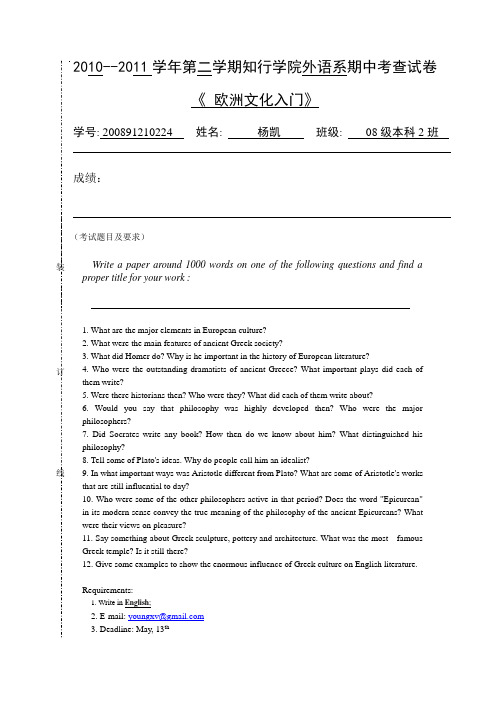
2010--2011学年第二学期知行学院外语系期中考查试卷《欧洲文化入门》学号: 200891210224 姓名: 杨凯班级: 08级本科2班成绩:(考试题目及要求)装订线Write a paper around 1000 words on one of the following questions and find a proper title for your work :1. What are the major elements in European culture?2. What were the main features of ancient Greek society?3. What did Homer do? Why is he important in the history of European literature?4. Who were the outstanding dramatists of ancient Greece? What important plays did each of them write?5. Were there historians then? Who were they? What did each of them write about?6. Would you say that philosophy was highly developed then? Who were the major philosophers?7. Did Socrates write any book? How then do we know about him? What distinguished his philosophy?8. Tell some of Plato's ideas. Why do people call him an idealist?9. In what important ways was Aristotle different from Plato? What are some of Aristotle's works that are still influential to day?10. Who were some of the other philosophers active in that period? Does the word "Epicurean" in its modern sense convey the true meaning of the philosophy of the ancient Epicureans? What were their views on pleasure?11. Say something about Greek sculpture, pottery and architecture. What was the most famous Greek temple? Is it still there?12. Give some examples to show the enormous influence of Greek culture on English literature.Requirements:1. Write in English;2. E-mail: youngxv@3. Deadline: May, 13thThe Main Features of Ancient Greek SocietyAncient Olympic GamesThe Olympic Games begun at Olympia in Greece in 776 BC. The Greek calendar was based on the Olympiad, the four-year period between games. The games were staged in the wooded valley of Olympia in Elis. Here the Greeks erected statues and built temples in a grove dedicated to Zeus, supreme among the gods. The greatest shrine was an ivory and gold statue of Zeus. Created by the sculptor Phidias, it was considered one of the Seven Wonders of the World. Scholars have speculated that the games in 776 BC were not the first games, but rather the first games held after they were organized into festivals held every four years as a result of a peace agreement between the city-states of Elis and Pisa. The Eleans traced the founding of the Olympic games to their King Iphitos, who was told by the Delphi Oracle to plant the olive tree from which the victors' wreaths were made.According to Hippias of Elis, who compiled a list of Olympic victors c.400 BC, at first the only Olympic event was a 200-yard dash, called a stadium. This was the only event until 724 BC, when a two-stadia race was added. Two years later the 24-stadia event began, and in 708 the pentathlon was added and wrestling became part of the games. This pentathlon, a five-event match consisted of running, wrestling, leaping, throwing the discus, and hurling the javelin. In time boxing, a chariot race, and other events were included.The victors of these early games were crowned with wreaths from a sacred olive tree that grew behind the temple of Zeus. According to tradition this tree was planted by Hercules (Heracles), founder of the games. The winners marched around the grove to the accompaniment of a flute while admirers chanted songs written by a prominent poet.The Olympic Games were held without interruptions in ancient Greece. The games were even held in 480 BC during the Persian Wars, and coincided with the Battle of Thermopylae. Although the Olympic games were never suspended, the games of 364 BC were not considered Olympic since the Arkadians had captured the sanctuary and reorganized the games.After the Battle of Chaironeia in 338 BC, Philip of Makedon and his son Alexander gained control over the Greek city-states. They erected the Philippeion (a family memorial) in the sanctuary, and held political meetings at Olympia during each Olympiad. In 146 BC, the Romans gained control of Greece and, therefore, of the Olympic games. In 85 BC, the Roman general Sulla plundered the sanctuary to finance his campaign against Mithridates. Sulla also moved the 175th Olympiad (80 BC) to Rome.The games were held every four years from 776 BC to 393 AD, when they were abolished by the Christian Byzantine Emperor Theodosius I. The ancient Olympic Games lasted for 1170 years.The successful campaign to revive the Olympics was started in France by Baron Pierre de Coubertin late in the 19th century. The first of the modern Summer Games opened on Sunday, March 24, 1896, in Athens, Greece. The first race was won by an American college student named James Connolly.Myths and the Olympic GamesPelops mythThere are several Greek myths about how the games were started. The most common myth was the story of the hero Pelops, after whom the Peloponnese is named ("Pelops’ isle"). The story of Pelops was displayed prominently on the east pedimental sculptures of the Temple of Zeus. Pelops was a prince from Lydia in Asia Minor who sought the hand of Hippodamia, the daughter of King Oinomaos of Pisa. Oinomaos challenged his daughter's suitors to a chariot race under the guarantee that any young man who won the chariot race could have Hippodamia as a wife. Any young man who lost the race would be beheaded, and the heads would be used as decoration for the palace of Oinomaos. With the help of his charioteer Myrtilos, Pelops devised a plan to beat Oinomaos in the chariot race. Pelops and Myrtilos secretly replaced the bronze linchpins of the King's chariot with linchpins made of wax. When Oinomaos was about to pass Pelops in the chariot race, the wax melted and Oinomaos was thrown to his death. Pelops married Hippodamia and instituted the Olympic games to celebrate his victory. A different version of the myth refers to the Olympic games as funeral games in the memory of Oinomaos.Hercules (Herakles) mythAnother myth about the origin of the Olympic Games comes from the T enth Olympian Ode of the poet Pindar. He tells the story of how Herakles, on his fifth labor, had to clean the stables of King Augeas of Elis. Herakles approached Augeas and promised to clean the stables for the price of one-tenth of the king's cattle. Augeas agreed, and Herakles rerouted the Kladeos and Alpheos rivers to flow through the stables. Augeas did not fulfill his promise, however, and after Herakles had finished his labors he returned to Elis and waged war on Augeas. Herakles sacked the city of Elis and instituted the Olympic Games in honor of his father, Zeus. It is said that Herakles taught men how to wrestle and measured out the stadium, or the length of the footrace.The Importance of the Olympic GamesThe Importance of Ancient Greek AthleticsThe ancient Greeks were highly competitive and believed strongly in the concept of "agon", or "competition" or "contest". The ultimate Greek goal was to be the best. All aspects of life, especially athletics, were centered around this concept. It was therefore considered one of the greatest honors to win a victory at Olympia. The fact that the only prize given at Olympia was an olive wreath illustrates this point. The athletes competed for honor, not for material goods.Athletics were of prime importance to the Greeks. The education of boys concentrated on athletics and music as well as academic subjects such as philosophy. Education took place in the gymnasion and the palaistra as well as the academy.The Religious Aspects of the Ancient Olympic GamesIn ancient Greece, games were closely connected to the worship of the gods and heroes. Games were held as part of religious ceremonies in honor of deceased heroes, a concept displayed in the funeral games for Patroklos in Book 23 of Homer's epic poem, The Iliad. Games were also held in the context of many ancient fertility festivals. The games at Olympia were connected with both the funeral games of Oinomaos, established by Pelops, and a fertility cult involving any number of gods and goddesses who were worshipped at the site. The Olympic games began to be usurped by the prominent cult of Zeus, and eventually lost much of their religious character.The Olympic Games and the Greek CalendarThe Greek calendar was based on the conception of the four-year Olympiad. When Greek historians referred to dates, they most often referred to a year (i.e., first, second, third, fourth) within the Olympiad that the event occurred. The winner of the stadium race in a given year had the Olympiad named in honor of him. The first Olympiad is therefore known as that of Koroibos of Elis, the winner of the stadium race in 776 BC.The Sacred TruceThe sacred truce was instituted during the month of the Olympiad. Messengers known as "spondorophoroi" carried the word of the truce and announced the date of the games all over the Greek world. The truce called for a cessation of all hostilities for a period of one month (later three months) to allow for the safe travel of athletes to and from Olympia. Armies and armed individuals were barred from entering the sanctuary. In addition, no death penalties could be carried out during the period of the truce.The Internationalization of the Olympic GamesFrom the beginning, the games at Olympia served as a bond between Greeks and strengthened the Greek sense of national unity. During the Hellenistic period, Greeks who came to live in foreign surroundings such as Syria, Asia, and Egypt, strove to hold on to their culture. One of the ways to achieve this was to build athletic facilities and continue their athletic traditions. They organized competitions, and sent competitors from their towns to compete in the Panhellenic games.In the 2nd century A.D., Roman citizenship was extended to everyone within the Roman empire. From then on, the participation of many competitors from outside of Greece in the Olympic games, gave them to a degree, international nature.When the Greek government reinstated the games in 1896, this international character of the competitions was preserved by Baron de Coubertin. Now, 16 centuries later, the Olympic games attract competitors from countries all over the world.。
欧洲文化入门全译文精讲精练

欧洲文化入门全译文精讲精练欧洲文化入门是欧洲历史、艺术、宗教和社会现象等知识的概览,为了让人们更好地理解欧洲文化和古代历史,本文将通过介绍欧洲的古代文化、宗教、艺术创作、古老的政治体制以及当代的社会现象,来让大家对欧洲文化有一个基本的认识。
首先,欧洲古代文化的影响可以追溯到古希腊和罗马时期。
古希腊文化的影响在欧洲有着深远的影响,它被认为是现代西方文化的根基。
希腊精神因其影响力而被西方人认为是“经典”,由其形成了现代文化的一些基本原则。
罗马文化也在欧洲有着深远的影响。
罗马帝国在欧洲历史上有着重要的地位,它曾是西欧最大的政治实体。
罗马文化深深影响了欧洲的政治、法律、宗教、建筑、城市设计等元素,使之成为欧洲历史上不可或缺的一部分。
其次,欧洲的宗教在历史上也占据着重要的地位。
欧洲的宗教主要有教和。
教是欧洲最为流行的宗教,其影响力几乎覆盖了整个欧洲,长期以来,教对欧洲各国的政治、社会、文化和精神生活都产生了深远的影响。
也是欧洲历史上重要的宗教,它在欧洲古代文化中也有着重要的地位,受到了广泛的尊重,对现代欧洲文化产生了深远的影响。
此外,欧洲文化的艺术创作也是欧洲文化的重要组成部分。
艺术创作在欧洲历史上有着悠久的历史,从古希腊和罗马时期的雕塑和壁画,到中世纪的绘画,到文艺复兴时期的建筑和雕塑,以及19世纪以后艺术界的繁荣,欧洲文化的艺术创作都发挥着重要的作用。
最后,当代欧洲的社会现象也是欧洲文化的重要组成部分。
从政治至文化,欧洲社会的发展受到了多种因素的影响,形成了多元化的文化现象。
例如,欧洲的移民潮和多元文化的发展,使欧洲的文化更加丰富多彩,社会现象也更加多元化和复杂。
总之,欧洲文化是一种复杂而又悠久的文化,其古老的文化、宗教、艺术创作和当代社会现象都是欧洲文化的重要组成部分,为了更好地理解欧洲文化,我们需要多了解这些元素的发展史和影响力。
只有理解了欧洲文化的历史和现状,才能更好地发展和延续欧洲文化。
欧洲文化入门考试内容归纳中文版
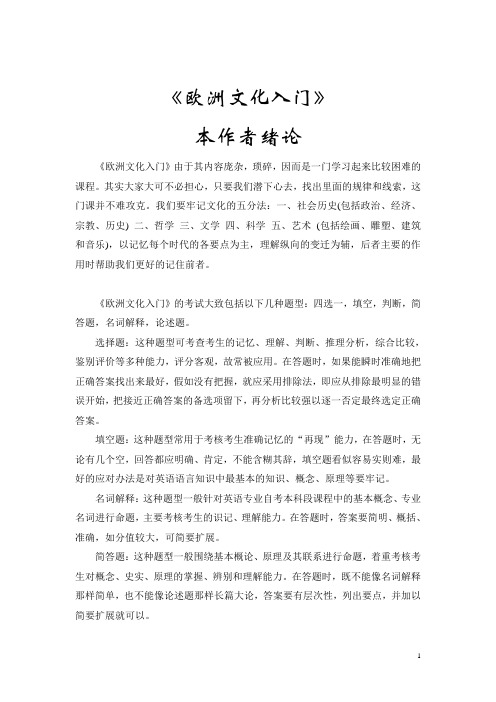
《欧洲文化入门》本作者绪论《欧洲文化入门》由于其内容庞杂,琐碎,因而是一门学习起来比较困难的课程。
其实大家大可不必担心,只要我们潜下心去,找出里面的规律和线索,这门课并不难攻克。
我们要牢记文化的五分法:一、社会历史(包括政治、经济、宗教、历史) 二、哲学三、文学四、科学五、艺术(包括绘画、雕塑、建筑和音乐),以记忆每个时代的各要点为主,理解纵向的变迁为辅,后者主要的作用时帮助我们更好的记住前者。
《欧洲文化入门》的考试大致包括以下几种题型:四选一,填空,判断,简答题,名词解释,论述题。
选择题:这种题型可考查考生的记忆、理解、判断、推理分析,综合比较,鉴别评价等多种能力,评分客观,故常被应用。
在答题时,如果能瞬时准确地把正确答案找出来最好,假如没有把握,就应采用排除法,即应从排除最明显的错误开始,把接近正确答案的备选项留下,再分析比较强以逐一否定最终选定正确答案。
填空题:这种题型常用于考核考生准确记忆的“再现”能力,在答题时,无论有几个空,回答都应明确、肯定,不能含糊其辞,填空题看似容易实则难,最好的应对办法是对英语语言知识中最基本的知识、概念、原理等要牢记。
名词解释:这种题型一般针对英语专业自考本科段课程中的基本概念、专业名词进行命题,主要考核考生的识记、理解能力。
在答题时,答案要简明、概括、准确,如分值较大,可简要扩展。
简答题:这种题型一般围绕基本概论、原理及其联系进行命题,着重考核考生对概念、史实、原理的掌握、辨别和理解能力。
在答题时,既不能像名词解释那样简单,也不能像论述题那样长篇大论,答案要有层次性,列出要点,并加以简要扩展就可以。
论述题:这种题型一般从试卷编制的全局出发,能从体现考试大纲中的重点内容和基本问题的角度来命题,着重考核考生分析、解决实际问题的能力,考核考生综合应用能力和创见性。
在答题时,要仔细审题,列出答案要点,然后对要点逐一展开叙述,此时考生应发挥自己的真知灼见,要在深度,广度上下功。
欧洲文化解读1000字

欧洲文化解读1000字中古的欧洲,一方面封建制度早已确立,许多独立的庄园、城市林立,领主之间相互征伐频繁,社会乱象丛生,分裂是主旋律。
另一方面,教皇与神圣罗马皇帝又都想通过自己的权力和影响力再现罗马帝国治下的那个统一的欧洲世界。
生产关系所决定的社会制度所带来的分裂势力与强大的世俗权力对统一欧洲的极度的追求和渴望相互作用,近代欧洲各主要国家就是在这样的矛盾背景下、在不断地调和矛盾的过程中产生的。
列国的成立,是中古收场的一个重要表征。
中古之时,欧洲外蒙统一知名,内具分裂之实。
列国既兴起,乃把统一的面幕撕开,把封建的乱象扫除;政治上的欧洲,始达到了名实相符的低位。
诚然,不同的国家的形成有着各自不同的诱因,但从宏观的历史规律的角度去看,共同的背景使得这些国家在产生原因上也有相同之处。
首先,各国君主的权力日渐扩大。
割据与战乱使得欧洲人民生活水深火热,虽然神圣罗马皇帝和教皇都致力于统一欧洲,但随着二者权势的跌落,这一梦想也就化为泡影。
代之兴起的各地君权,能够收束地方诸侯、稳定局面,他们的日渐强大顺应了历史潮流,为列国的形成及地位巩固打下了基础。
列国的成立,乃是君权伸张的结果,因为列国对于封建是一个集合的运动。
其次,随着生产的发展,欧洲城市兴起,资产阶级产生并日渐壮大。
这些人以商贸为生,渴望秩序与和平,畏惧战乱。
于是,他们也就极力支持本国君主对于国家成立的努力。
而且,本国君权的加强又可以使得他们进一步摆脱教会的羁绊。
因此,当国王与教皇起冲突时,总能从他们那获得极大地支持。
列国的成立,乃是中等阶级产生后的一个结果。
最后,方言文学的兴起。
中世纪,拉丁文是通用语言,在书面作品中及其它正式的场合都要使用拉丁文。
但是,各地本土语言又与拉丁文结合产生了各地的方言。
以意大利诗人但丁的《神曲》为代表的方言文学以不可阻挡的势头兴起,为各国的民俗风情、历史、意愿的表述提供了适宜的工具。
国成立的第三个原因,是方言文学的兴起。
另外,诸如意大利佛罗伦萨的马基雅维利的《君主论》等政治类著作的出现,也为各国君主建立民族国家提供了理论参考。
西方文化入门
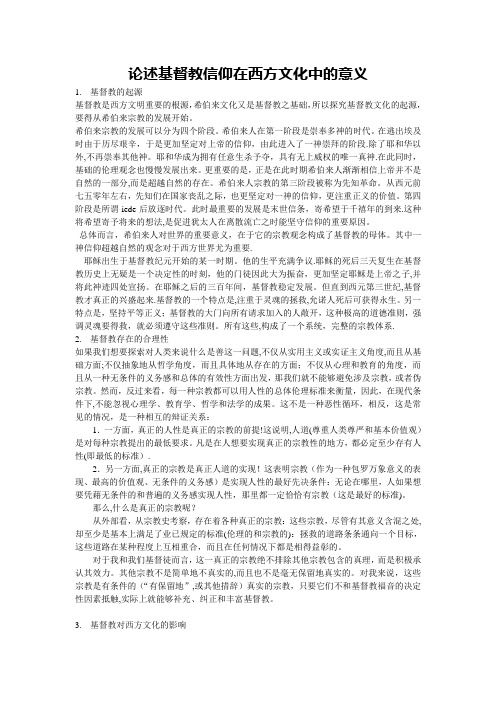
论述基督教信仰在西方文化中的意义1.基督教的起源基督教是西方文明重要的根源,希伯来文化又是基督教之基础,所以探究基督教文化的起源,要得从希伯来宗教的发展开始。
希伯来宗教的发展可以分为四个阶段。
希伯来人在第一阶段是崇奉多神的时代。
在逃出埃及时由于历尽艰辛,于是更加坚定对上帝的信仰,由此进入了一神崇拜的阶段.除了耶和华以外,不再崇奉其他神。
耶和华成为拥有任意生杀予夺,具有无上威权的唯一真神.在此同时,基础的伦理观念也慢慢发展出来。
更重要的是,正是在此时期希伯来人渐渐相信上帝并不是自然的一部分,而是超越自然的存在。
希伯来人宗教的第三阶段被称为先知革命。
从西元前七五零年左右,先知们在国家丧乱之际,也更坚定对一神的信仰,更注重正义的价值。
第四阶段是所谓iede后放逐时代。
此时最重要的发展是末世信条,寄希望于千禧年的到来.这种将希望寄予将来的想法,是促进犹太人在离散流亡之时能坚守信仰的重要原因。
总体而言,希伯来人对世界的重要意义,在于它的宗教观念构成了基督教的母体。
其中一神信仰超越自然的观念对于西方世界尤为重要.耶稣出生于基督教纪元开始的某一时期。
他的生平充满争议.耶稣的死后三天复生在基督教历史上无疑是一个决定性的时刻,他的门徒因此大为振奋,更加坚定耶稣是上帝之子,并将此神迹四处宣扬。
在耶稣之后的三百年间,基督教稳定发展。
但直到西元第三世纪,基督教才真正的兴盛起来.基督教的一个特点是,注重于灵魂的拯救,允诺人死后可获得永生。
另一特点是,坚持平等正义;基督教的大门向所有请求加入的人敞开,这种极高的道德准则,强调灵魂要得救,就必须遵守这些准则。
所有这些,构成了一个系统,完整的宗教体系.2.基督教存在的合理性如果我们想要探索对人类来说什么是善这一问题,不仅从实用主义或实证主义角度,而且从基础方面;不仅抽象地从哲学角度,而且具体地从存在的方面;不仅从心理和教育的角度,而且从一种无条件的义务感和总体的有效性方面出发,那我们就不能够避免涉及宗教,或者伪宗教。
《欧洲文化入门》讲稿

《欧洲文化入门》讲稿Division One Greek Culture and Roman CultureI. Teaching Objectives1. get to know the historical context of ancient Greece and ancient Rome;2. be clear about the great achievements of ancient Greeks and Romans in various fields such as literature, philosophy, science and art;3. understand the significance and impact of Greek culture and Roman culture.II. The Points to Be Highlighted1. Democracy of ancient Greece.2. 3 styles of columns in ancient Greek architecture.3. The greatest names in European philosophy ---- Socrates, Plato and Aristotle4. Impact (1). Spirit of Innovation (2). Supreme Achievement (3). Lasting effectIII. Teaching Approaches1. Pair/Group work2. Discussion 3 Task-based approach 4. Communicative approach 5. Questions and answerIV. Background InformationThe Parthenon (447—432 B.C.) --- the most important of ancient Greek T emples the finest monument of Greek architecture and sculpture in more than 2000 yearsV. Teaching Procedures and ContentsLead-in (or) Warming-up●How much do you know about Greece (ancient or modern)?●Do you know when the first Modern Olympic Games washeld?●Homer was famous for two epics. Do you know what they are?●There are many famous philosophers in ancient Greece. Could you name some of them?●You must have ever heard of the following sentence, ―Give me a place to stand, and I willmove the world. Do you know who said it?Specific ContentsGreek Culture:1. The Historical Context(1). 1200 B.C. the war of Troy a war was fought between Greece and Troy, ending in the destruction of Troy.(2). 5th century B.C. Greek culture reached a high point of development. --- successful repulse of the Persian invasion --- the establishment of democracy --- the flourishing of science, philosophy, literature, art and historical writing in Athens The century closed with civil war between Athens and Sparta(3). In the second half of the 4th century B.C. all Greece was brought under the rule of Alexander, king of Macedon Greek culture was spread(4). In 146 B.C. the Romans conquered Greece2. Social and Political StructurePolitics --- Athens was a democracyDemocracy means ―exercise of power by the whole people. But ―the whole people‖ the G reeks meant only the adult male citizens.Economy --- the economy of Athens rested on an immense amount of slave labour. There was harsh exploitation in Greek societySports --- Greeks loved sports A big festival on Olympus Mount once every 4 year ---- Olympic GamesModern Olympic Games revived in 1896 顾拜旦(法)3. Homer ( probably lived around 700 B.C.)Two epics: Iliad / OdysseusThey are about great men and wars of a remoter age, probably in the period 1200—1100 B.C 4. Lyric Poetry Sappho (about 612—580 B.C.) woman poetShe is noted for her love poems of passionate intensity, some of which are addressed to women. She was considered the most important lyric poet of ancient Greece. Many Greek and Latin writers know nearly all her poems by heart. But in the 10th century the Christian church burned her works. Only fragments remain.Pindar (about 518—438 B.C.) He is best known for his odes celebrating the victories at the athletic games, such as the 14 Olympian odes. Pindar also had imitators, such as the 17th-century English poet John Dryden.5. DramaOrigin: perform plays at religious festivals.Development: in the 5th century B.C. a powerful drama developedStates: open-air theatres, audience sat on stone benches and looked down at the stage from three sides, actors wore masks.Tragedya. Aeschylus (525 — 456 B.C.)Works: Prometheus Bound, Persians, and Agamemnon. In these plays there are only two actors and a chorus. Yet they manage to stir and move the audience deeply by showing heroes and heroines in complicated human situations, out of which thereis no escape but death. The plays are written in verse. Aeschylus is noted for his vivid character portrayal and majestic poetry.b. Sophocles (496 --- 406 B.C.)Works: Oedipus the King, Electra《厄勒克特拉》, and Antigone《安提戈涅》. Contribution: he added a third actor and decreased the size of the chorus. Sophodcles has had a strong impact on European literature. Some of his plots were taken over and adoped by later writers. The Austrian psychiatrist Sigmund Freud‘s term ―the Oedipus complex‖ was also derived from Sophocles‘s play.c. Euripides (484 --- 406 B.C.)Works: Andromache《安德洛玛刻》, Medea《美狄亚》, and Trojan Women.ComedyAristophanes (about 450 --- 380 B.C.)Works: Frogs, Clouds, Wasps and Birds These plays are loose in plot and satirical in tone. 6. HistoryHistorical writing started early in Greece.a. Herodotus (484 --- 430 B.C.) ―Father of History‖, he wrote about the wars between Greeks and Persians. His history, full of anecdotes and digressions and lively dialogue, is wonderfully readable. He kept alive many traditional stories, which were not always accurate. His object in writing was ―that the great and wonderful deeds done by Greeks and Persians should not lack renown.‖b. Thucydides (about 460 --- 404 B.C.) Younger than Herodotus, he is more accurate as an historian. He traced events to their causes and brought out their effects. He was never dull, but wrote with imagination and power. He was called ―the greatest historian that ever lived.‖by Macaulay (an eminenthistorian)7. Philosophy and ScienceThe ancient Greeks were curious about many things, including what made the universe. They had the spirit of free enquiry and were quite ready to drop established ideas, to speculate, to use their imagination and to form their own conclusions. They were also not afraid to speak their minds. Pythagoras (about 580 --- 500 B.C.) had the idea that all things were mumber.Heracleitue (about 540 --- 480 B.C.) believed fire to be the primary element of the universeHe also said: You cannot step twice into the same river. The sun is new everydayDemocritus (about 460 --- 370 B.C.) speculated about the atomic structure of matter. He was one of the earliest exponents of the atomic theory.a. Socrates ( about 470 --- 399 B.C.) details in textbook P-23The dialectical method --- method of argument, by questions and answers.Greek philosopher who initiated a question-and-answer method of teaching as a means of achieving self-knowledge. His theories of virtue and justice have survived through the writings of Plato, his most important pupil. Socrates was tried for corrupting the minds of Athenian youth and subsequently put to death (399).苏格拉底希腊哲学家,首创了问答工教学方法,作为获得认识自我的一种方法。
大学《欧洲文化入门》试题及答案

5.Can you outline the geo-cultural area of Europe and the West? (20%)
(2)生理学和医学
比利时医生维萨留斯发表《人体结构》一书,对盖伦的“三位一体”学说提出挑战。西班牙医生塞尔维特发现血液的小循环系统,证明血液从右心室流向肺部,通过曲折路线到达左心室。英国解剖学家哈维通过大量的动物解剖实验,发表《心血运动论》等论著,系统阐释了血液运动的规律和心脏的工作原理。他指出,心脏是血液运动的中心和动力的来源。这一重大发现使他成为近代生理学的鼻祖。
3.Can you list some important values of Renaissance(20%)
答:(1)物理学
在物理学方面,伽利略通过多次实验发现了落体、抛物体和振摆三大定律,使人对宇宙有了新的认识。他的学生托里拆利经过实验证明了空气压力,发明了水银柱气压计。法国科学家帕斯卡尔发现液体和气体中压力的传播定律。英国科学家波义耳发现气体压力定律。
(3)“地理大发现”
航海技术产生了一次革命性地飞跃,葡萄牙、西班牙、意大利的探险家们开始了一系列远程航海活动。4.Can you explain the importance of French Revolution? (20%)
欧洲文化入门(精品英文PPT课件)
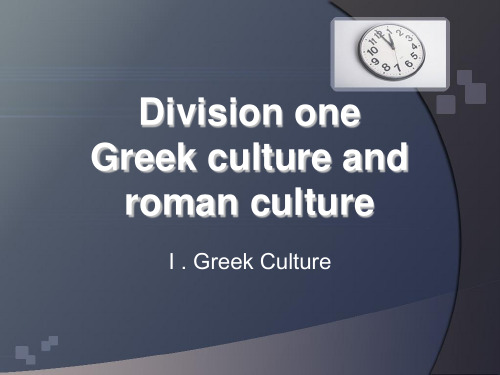
Division one Greek culture and roman culture
I . Greek Culture
Group one
• Leader:胡锦璞 • Members:孙京、杨建勋、赵元硕、段娟娟
• • • • •
Part 1-3 Part 4-6 Part 7 Part 8 Part 9
胡锦璞 赵元硕 段娟娟 杨建勋 孙 京
1、The Historical Background
• TIME: around 1200B.C. • Establishment : after the war between Greece and Troy. • Cultural Significance: mark by the successful repulse of the Persian invasion . • Spread : Alexander and his armies conquered large areas of Europe Asia and Africa. • End: it was conquered by the Romans
• The Histories — his masterpiece and the only work he is known to have produced — is a record of his "inquiry" , being an investigation of the origins of the Greco-Persian Wars and including a wealth of geographical and ethnographical information. Although some of his stories were not completely accurate, he claimed that he was reporting only what had been told to him. Little is known of his personal history since ancient records are scanty, contradictory and often fanciful.
西方文化概论
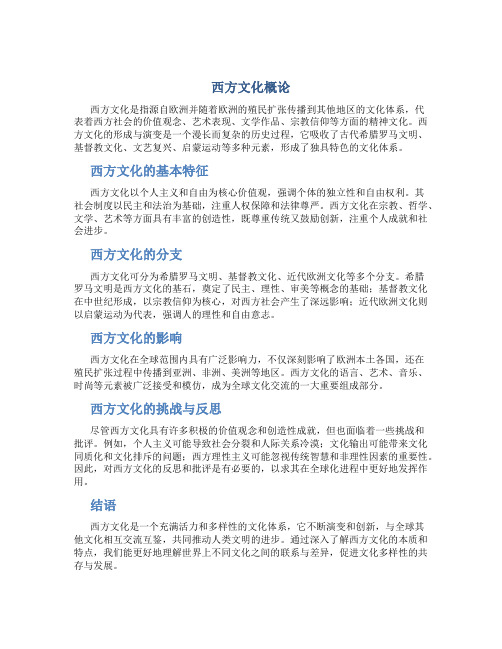
西方文化概论西方文化是指源自欧洲并随着欧洲的殖民扩张传播到其他地区的文化体系,代表着西方社会的价值观念、艺术表现、文学作品、宗教信仰等方面的精神文化。
西方文化的形成与演变是一个漫长而复杂的历史过程,它吸收了古代希腊罗马文明、基督教文化、文艺复兴、启蒙运动等多种元素,形成了独具特色的文化体系。
西方文化的基本特征西方文化以个人主义和自由为核心价值观,强调个体的独立性和自由权利。
其社会制度以民主和法治为基础,注重人权保障和法律尊严。
西方文化在宗教、哲学、文学、艺术等方面具有丰富的创造性,既尊重传统又鼓励创新,注重个人成就和社会进步。
西方文化的分支西方文化可分为希腊罗马文明、基督教文化、近代欧洲文化等多个分支。
希腊罗马文明是西方文化的基石,奠定了民主、理性、审美等概念的基础;基督教文化在中世纪形成,以宗教信仰为核心,对西方社会产生了深远影响;近代欧洲文化则以启蒙运动为代表,强调人的理性和自由意志。
西方文化的影响西方文化在全球范围内具有广泛影响力,不仅深刻影响了欧洲本土各国,还在殖民扩张过程中传播到亚洲、非洲、美洲等地区。
西方文化的语言、艺术、音乐、时尚等元素被广泛接受和模仿,成为全球文化交流的一大重要组成部分。
西方文化的挑战与反思尽管西方文化具有许多积极的价值观念和创造性成就,但也面临着一些挑战和批评。
例如,个人主义可能导致社会分裂和人际关系冷漠;文化输出可能带来文化同质化和文化排斥的问题;西方理性主义可能忽视传统智慧和非理性因素的重要性。
因此,对西方文化的反思和批评是有必要的,以求其在全球化进程中更好地发挥作用。
结语西方文化是一个充满活力和多样性的文化体系,它不断演变和创新,与全球其他文化相互交流互鉴,共同推动人类文明的进步。
通过深入了解西方文化的本质和特点,我们能更好地理解世界上不同文化之间的联系与差异,促进文化多样性的共存与发展。
- 1、下载文档前请自行甄别文档内容的完整性,平台不提供额外的编辑、内容补充、找答案等附加服务。
- 2、"仅部分预览"的文档,不可在线预览部分如存在完整性等问题,可反馈申请退款(可完整预览的文档不适用该条件!)。
- 3、如文档侵犯您的权益,请联系客服反馈,我们会尽快为您处理(人工客服工作时间:9:00-18:30)。
一.名词解释
1.Homer Epics:是相传由古希腊盲诗人荷马创作的两部长篇史诗《伊利亚特》和《奥德赛》的统称。
两部史诗都分成24卷,这两部史诗最初可能只是基于古代传说的口头文学,靠着乐师的背诵流传。
它作为史料,不仅反映了公元前11世纪到公元前9世纪的社会情况,而且反映了迈锡尼文明。
它再现了古代希腊社会的图景,是研究早期社会的重要史料。
《荷马史诗》不仅具有文学艺术上的重要价值,它在历史、地理、考古学和民俗学方面也提供给后世很多值得研究的东西。
2.Plato:(约前427年-前347年),古希腊伟大的哲学家,也是全部西方哲学乃至整个西方文化最伟大的哲学家和思想家之一,他和老师苏格拉底,学生亚里士多德并称为古希腊三大哲学家。
另有其他概念包括:柏拉图主义、柏拉图式爱情、经济学图表等含义。
3.Cleopatra:即克丽奥佩托拉七世(希腊语:又译克利欧佩特拉七世;约前70年12月或前69年1月—约前30年8月12日)是古埃及托勒密王朝的最后一任法老。
4.Rome Republic:公元前510年罗马人驱逐了前国王暴君卢修斯·塔克文·苏佩布(高傲者塔克文),结束了罗马王政时代,建立了罗马共和国,国家由元老院、执政官和部族会议(Comitia Tributa)三权分立。
掌握国家实权的元老院由贵族组成。
执政官由百人队会议从贵族中选举产生,行使最高行政权力。
部族大会由平民和贵族构成。
二.简答
1.What are the seven wonder for the ancient Greek people?
1.克罗索斯宫殿
2.帕特农神庙
3.伊匹杜拉斯剧场
4.罗德斯岛太阳神阿波罗巨像
5.奥林匹亚宙斯神像
6.月神阿尔timi斯的亚底米神庙
7.摩索拉斯基凌
2.How does Greek Mythology influence European Lierature?
古希腊、罗马文学是欧洲最早的文学,可以说是欧洲文学的开端。
它们都是欧洲奴隶社会的产物。
古希腊文学中的神话和史诗则反映了更早的、从氏族社会过渡到奴隶社会时的希腊生活和斗争。
罗马文学产生在古希腊文学之后,它使我们对欧洲奴隶社会的生活和斗争有更充分的认识。
它是古希腊和后代欧洲文学之间的桥梁,在某些方面也有着独特的成就。
近代欧洲各国文学在古希腊、罗马文学中获得不少启示,不断从中吸取养分。
3.My understanding of Western Culture。
